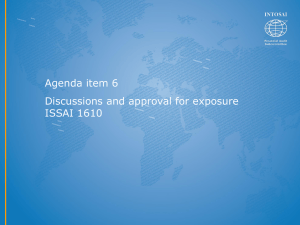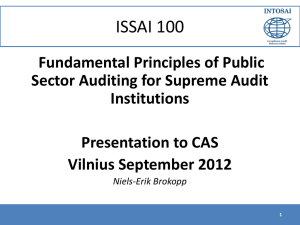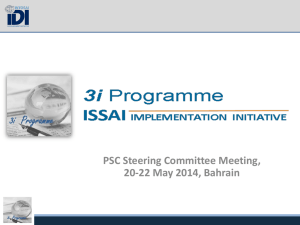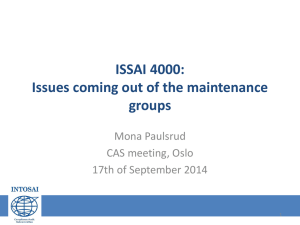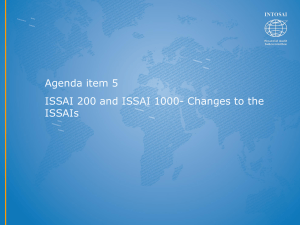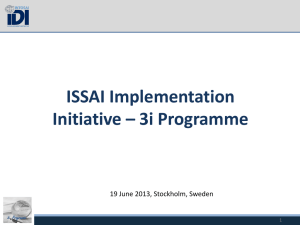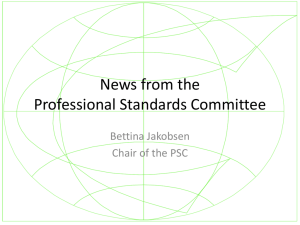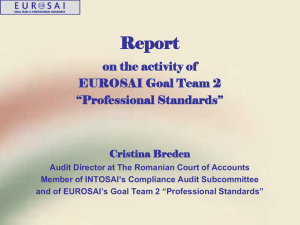Harmonization Project
advertisement
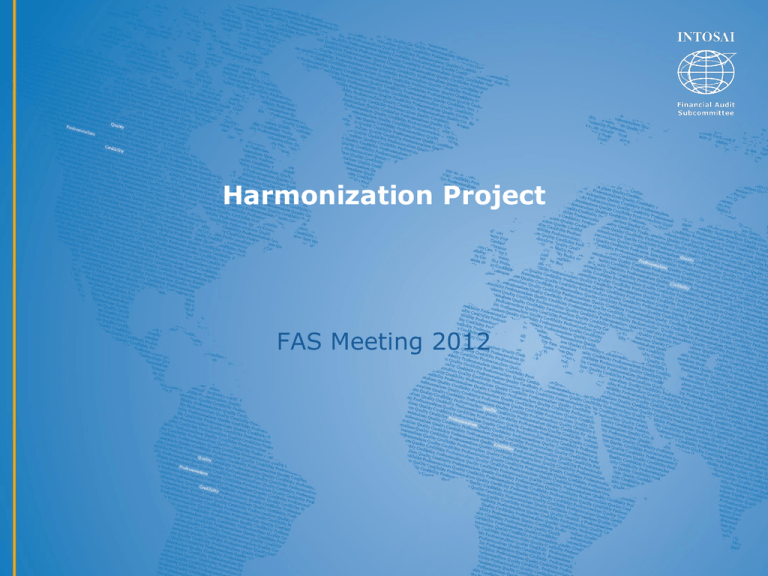
Harmonization Project FAS Meeting 2012 Harmonization project and ISSAI 200 • Purpose and scope of the project • The purpose is to provide a conceptual basis for public sector auditing and ensure consistency in the ISSAI framework. • Goals: • A: Revise the ISSAI 100-999 Fundamental Auditing Principles, in order to ensure that: • they describe the general role and auditing function of a SAI and are relevant and useful for all members of INTOSAI; • they provide overview and further references to the full set of ISSAIs where more operational guidance is provided; • they provide a consistent set of concepts and an improved link between ISSAI 1 The Lima Declaration and the new set of comprehensive guidelines that are launched in 2010 2 Harmonization project • B: Make the limited editorial changes in ISSAIs 10-99 which are necessary in order to carry the revision of ISSAIs 100-999 through and improve consistency between the two levels of documents. • C: Ensure alignment between the ISSAI 1000-4999 Implementation Guidelines and the new set of ISSAIs 100-999 Fundamental Auditing Principles. The alignment includes: • consolidating the terminology of the full set of ISSAIs 100-4999 in accordance with a general glossary for the ISSAI Framework and ensure updated cross-references between the different ISSAIs; • considering the extent to which there is a need to make further amendments in the ISSAI 1000-4999 guidelines as a consequence of new ISSAIs 100-999 Fundamental Auditing Principles, e.g. in areas where text is moved from the guidelines to the principles, or where unintended differences between the different sets of guidelines exist. 3 Harmonization Project • 4 new ISSAIs on level 3 • ISSAi 100 Fundamental Principles of Public Sector Auditing • ISSAI 200 Fundamental principles of Financial Audit • ISSAI 300 Fundamental Principles of Performance Audit • ISSAI 400 Fundamental Principles of Compliance Audit Harmonization Project • ISSAI 100- approved for exposure by PSC in June 2012. • ISSAI 200- will be approved for exposure by PSC following a written procedure in October • ISSAI 300- approved for exposure by PSC in June 2012. • ISSAI 400- will be approved for exposure by PSC following a written procedure in October ISSAI 100- structure • • • • • Purpose and Authority Framework Elements Principles to be applied Making Reference to the ISSAIs • ISSAI 200-400 will basically follow the same structure ISSAI 100 • Purpose: ” to provide the fundamental principles which are applicable to all public sector audit engagements whatever its form or context”. • Authority: The Fundamental Auditing Principles represent the core of the detailed auditing standards contained on level 4 of the ISSAI framework. The principles can be used in two ways: • To form the basis on which standards are developed, or on which consistent national standards are adopted. • To form the basis for adoption of the General Auditing Guidelines (ISSAIs 1000-4999) as authoritative standards. ISSAI 100 – General Principles Ethics & Independence Quality control Audit / engagement risk Engagement team management & skills Communication with auditees and other stakeholders Documentation Professional scepticism and judgement Materiality ISSAI 100- Principles related to the audit process 18 High Level Principles formulated ISSAI 200-400 • The ISSAI 200, 300 and 400 further elaborate on the principles to be applied in the context of financial auditing, performance auditing and compliance auditing. • ISSAI 200-400 also adds principles identified as fundamental for the type of audit • Note: • The project is under high time pressure- no time for alignement between 100-200-300-400 10 ISSAI 200 Main Challenges • To condense the more than 600 requirements in ISSAI 1000-1810 into a few principles • To make sure it is not understood as a substitute for the ISAs • To explain a process in a short document that originates from 1220 pages Goal • As far as possible a common structure with ISSAI 100 • To be read as ”Stand alone document” • To provide principles to all relevant areas covered by the ISAs (36 ISAs into one document) ISSAI 200 based on • • • • • ISSAI 1200-1810 ISSAI 1000 IFAC Framework A few parts of extant ISSAI 100-400 IPSAS 1 ISSAI 200 is developed with the following premises • • • • Relates to audits of financial statements A Financial Reporting Framework that is acceptable Adherence to Ethical and Quality Control Standards Reasonable Assurance Authority • Different views within the project group; • No authority at all • To be standards to malke reference to if SAIs cant achieve adherense to level 4 • Something else Use of ISSAI 200 • For SAIs applying the ISSAIs 1000-1810 as authoritative standard – No practical use • For SAIs adopting other national standards as authoritative standards- Provides an option to benchmark those against best practice of INTOSAI and if consistent to make such statements. • For SAIs developing their own authoritative standards- Provides an option to benchmark those against best practice of INTOSAI and if consistent to make such statements. ISSAI 200- 26 Principles • • • • • • • • Ethical requirements Quality Control requirements Engagement team and management skills Engagement Risk Professional Judgment and professional skepticism Materiality Agreeing the Terms of the Engagement Documentation • • • • • • • • • • • • • Communication Planning Understanding the audited organization Risk assessment Responses to assessed risks Considerations relating to fraud in an audit of financial statements Considerations of Going Concern Considerations relating to laws and regulations in an audit of financial statements Audit Evidence Considerations of subsequent events Evaluating misstatements Forming an Opinion and Reporting on the Financial Statements Considerations relevant for audits of the whole of government financial statements ISSAI 200 • General comments and views on the project and in specific ISSAI 200; • Authority? • Structure? • Level of detail? • The relationship to other ISSAIs • Detailed comments section by section • What are the implications for ISSAI 10001810? ISSUES TO DISCUSS • Clarifying the distinction between level 3 and level 4 of ISSAIs, • Clarifying the distinction between ISSAI 100 and ISSAI 200, • Clarifying what is the difference between the General Introduction to the INTOSAI Financial Audit Guidelines (see ISSAI 1000) and Overall Objectives of the Independent Auditor and the Conduct of an Audit in Accordance with the International Standards on Auditing (See ISSAI 1200)(because these two sections cover the basics) and the draft of ISSAI 200, and • Clarifying whether the drafting style allows for reference to the applicable section instead of repeating text.
